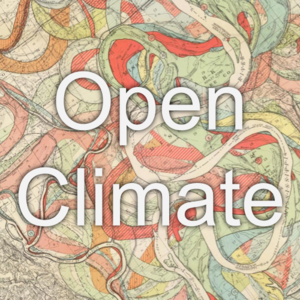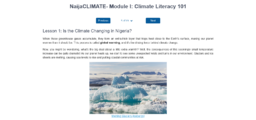
What are the links between the planetary and the digital commons? It was to answer this question that we formed the Open Climate collective, a group of colleagues from the open technology & knowledge movement who felt the pressing need to address the missing opportunities for collaboration in climate action..[1]
Open Climate facilitated 13 community calls during 2020 and 2022, and engaged over 300 participants from different areas of expertise. We explored together initiatives across the open movement to enable climate action using knowledge, technologies and community participation.
We also selected seven practitioners out of 270 applications to be part of the Open Climate Fellowship in 2023, which incubated a variety of initiatives that used open knowledge (spanning from governments to grassroots organizations) to support localized climate action.
The challenges of openness towards climate action[edit | edit source]
- Challenge #1: The climate movement is broad and its voices are not equally considered.
- What we consider as the 'climate change' movement is actually a variety of efforts in different areas such as technology, education, policy, and environmental sciences.[2]
- Not all climate change efforts are equally valued. The areas of focus in climate-change social sciences receive 700% less funding compared to natural sciences.[3]
- Challenge #2: The climate crisis poses an existential threat to humanity. Data and digital technologies should align to address it.
- Open data and knowledge can support verifiable social and political narratives, to address denialism, disinformation, to communicate facts, and to enable civil discussions.
- Instead of data hoarding, open data and knowledge should rather help make informed decisions on how to address climate change.[3][4]
- Challenge #3: The integration and participation of a variety of actors in a way that is transparent and seeks to address common goals.
- Participatory knowledge addresses gaps at all levels: “data, and accessible data, is very important for frontline defenders. If the data is not available, then it is a lot harder to make any case (to governments).”[5]
- This lack of information also occurs in complex systems such as the Internet and digital technologies whose uses are increasing alongside its potential environmental impact, but are very difficult to measure.[4][6][7]
- Knowledge must be downscaled to national, local or personal levels, while addressing language, access and digital literacy inequalities.[8]
- “The more info we have, and the more info the communities have, in a format that they can understand and then share with other decision makers is really a vital piece of the whole movement of environmental justice & climate justice in the world.”[5]
The role of knowledge commons in climate policy[edit | edit source]
- Action-oriented:
- Led by a commonly-agreed purpose.
- Follows values such as transparency, accountability, non-extractivism and equality.
- Propelled by formal alliances and informal coalitions coordinating to address common challenges at international, national or local scales.
- User-oriented:
- Enables participation by being localized and relevant to "the smallest possible stakeholder".
- Produces appropriate and long-lasting solutions that will be adopted by the desired audiences.
- Addresses human rights, disinformation and democracy issues in relation to climate action.
- Participatory:
- Bridges access and digital literacy gaps.
- Produces influence in multiple directions (top-down, bottom-up, horizontal).
- Continuously opens opportunities for collaboration across interested parties.
Examples from the Open Climate Fellowship[edit | edit source]
The following are examples of the projects created for the 2023 Open Climate Fellowship.
-
Sadiat Adetoro Salau created NaijaCLIMATE, a two-module course on climate adaptation based on open sources such as Wikipedia pages to address disinformation in her local setting.
-
For his Open Climate Fellowship project, Luis Carrasco created data visualizations based governmental data about terrestrial ecosystems in Chile, to disseminate this information to broader audiences on the Spanish-language Wikipedia.
-
Rub(én) Solís integrated open access resources regarding the effects climate change on the Yucatán Peninsula and local interviews to local Mayan community members. The result is a series of graphic communication pieces translated to a non-technical language in Yucatecan Mayan language.
References[edit | edit source]
- ↑ Open Climate—Story. (2023, December 5). Open Climate. https://open-climate.org/story/
- ↑ Dosemagen, S., Heidel, E., Murillo, L. F. R., Velis, E., Stinson, A., & Thorne, M. (2021, June 14). Open Climate Now! Branch, 1(2). https://branch.climateaction.tech/issues/issue-2/open-climate-now/
- ↑ 3.0 3.1 Velis, E. (2021, September 13). What are the challenges of “openness” in environmental research of the climate crisis? Open Climate. https://medium.com/open-climate/what-are-the-challenges-of-openness-in-environmental-research-of-the-climate-crisis-3a7773bdabfb
- ↑ 4.0 4.1 Velis, E. (2021, September 10). How can openness help achieve a fossil-free Internet by 2030? Open Climate. https://medium.com/open-climate/how-can-openness-help-achieve-a-fossil-free-internet-by-2030-ff07eb5a784d
- ↑ 5.0 5.1 Heidel, E. (2022, March 28). Frontline organizers and the knowledge commons: Kicking Off Season 2 of Open Climate Calls. Open Climate. https://medium.com/open-climate/frontline-organizers-and-the-knowledge-commons-kicking-off-season-2-of-open-climate-calls-154ca839ee2c
- ↑ Mulrow, J., Gali, M., & Grubert, E. (2021). The cyber-consciousness of environmental assessment: How environmental assessments evaluate the impacts of smart, connected, and digital technology. Environmental Research Letters, 17(1), 013001. https://doi.org/10.1088/1748-9326/ac413b
- ↑ Roussilhe, G. (2021). Report: Fog of Enactment. The Green Web Foundation. https://www.thegreenwebfoundation.org/publications/report-fog-of-enactment/
- ↑ Murillo, L. F. (2021, June 8). Open Climate community call: May 25th, 2021. Open Climate. https://medium.com/open-climate/open-climate-call-3-d0607a3b388
See also[edit | edit source]
- Thorne, M., Dosemagen, S., Heidel, E., Stinson, A., Murillo, L. F. R., & Velis, E. (2022). Open Climate Then and Now. Branch, 1(4). https://branch.climateaction.tech/issues/issue-4/open-climate-then-and-now/
- Velis, E. (2023, April 19). Cultivating a Post-Growth Relationship with Knowledge. Resilience. https://www.resilience.org/stories/2023-04-19/cultivating-a-post-growth-relationship-with-knowledge/


